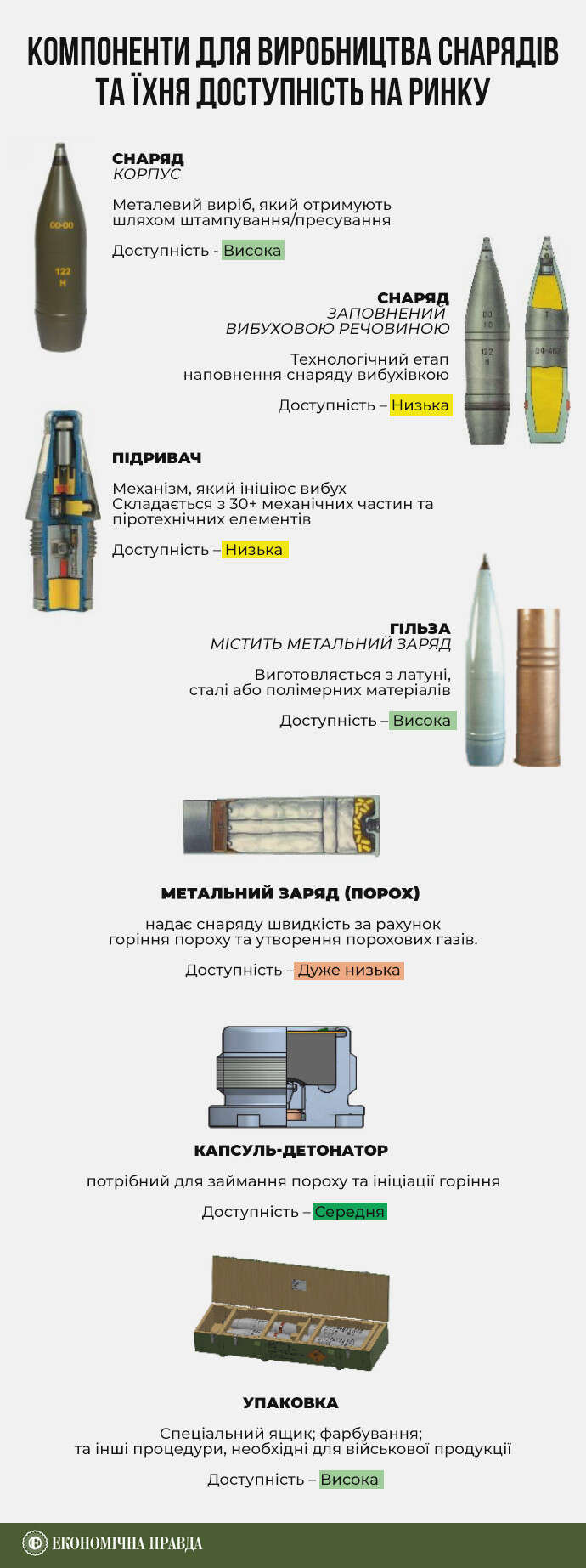Shells that didn’t arrive: how the failure of state orders undermines Ukraine’s defence capability

Shells that didn’t arrive: how the failure of state orders undermines Ukraine’s defence capability
In the conditions of war, the government decided to give a large order for the production of a key type of ammunition to one state-owned company. However, it failed to meet both the volume and quality of production. How did this become possible?
This is discussed in an investigation by "Economic Pravda".
Ammunition production is a top priority for the front lines and at the same time a vulnerable point of the Ukrainian defence industry. Consistent inaction of relevant officials until 2022 led to Ukraine being completely incapable of producing mortar and artillery ammunition at the beginning of the great war.
In 2022, domestic factories were mastering the technology and building production lines. In 2023, the first serial batches of Ukrainian shells and mines started to arrive. 2024 was supposed to be the year when really large volumes of ammunition would roll off the conveyor.
This year, the government placed a big bet on domestic producers. However, one of the factories, which EP will not name for security reasons, received an abnormally high level of trust from the state. Along with it came several contracts worth tens of billions of hryvnias and a 75% advance payment.
The ability of this factory to fulfill an order for a gigantic batch of ammunition, which it had previously produced very little of, was in doubt from the start among the relevant authorities. The manufacturer clearly lacked production space, equipment, personnel, faced missile attack risks, yet agreements with them were still signed.
The saga with the shells dragged on throughout 2024. Ultimately, the scandal with defective 120-mm mines in the troops is only the visible part of the problem, as significantly more ammunition was not delivered at all.
The factory simply terminated part of the deals and returned the money to the budget, while for others, it postponed the completion dates to 2025, leaving the military on the front line short of hundreds of thousands of mines and shells during the hottest phase of the large-scale Russian offensive along the entire front line.
Ukraine has made significant progress in the production of artillery, drones, and other types of weapons. But the story of the failure of these mentioned contracts for the supply of mines and shells should force officials and the military to take off their rose-tinted glasses. Either they start looking at the capabilities of domestic factories realistically, or the scale of problems in the conditions of missile strikes and the global shortage of explosives will grow significantly.
The minefield of procurement
The military experiences a chronic shortage of shells and mines and fires everything they receive. Every batch of ammunition buys time in deterring the enemy and saves the lives of defenders.
Western caliber ammunition is mainly supplied by partners, as they have the relevant stocks and production capabilities. But with Soviet calibers it’s more complicated – they are produced only by Russians, their allies, Ukrainian factories, and a few countries in the European Union.
Ukraine often buys shells with its own money and spends billions of dollars from the state budget on this. The Ministry of Defence has three options with whom to contract: special-importer companies (intermediaries), foreign manufacturers, and domestic factories.
There is no reliable supplier among them. Today, all three options contain high risks.
Special-importer companies operate with established connections and market experience, finding ammunition even in unfriendly countries. But their logistical chains are complex, and counterparts are not always clear, so the quality of products and delivery times often do not meet the declared standards. There are cases when individual special-importer companies simply take state money and supply nothing to the military.
Direct contracting with foreign manufacturers is limited because Ukraine has to compete with other countries, and some European companies fundamentally work exclusively through intermediaries, having a financial interest in this. Additionally, the global shortage of explosives leads to delivery delays at factories worldwide.
Domestic manufacturers are understandable, work solely for the needs of the Ukrainian army, and leave part of the funds within the country, but their factories are constantly under hostile missile attacks. Additional risks, such as a lack of experience, equipment, technology, and qualified personnel, can lead to production disruptions.
Eventually, Ukrainian factories also feel the global shortage of explosives and specific components. Perhaps even more acutely than other manufacturers because, unlike Western defence corporations, domestic companies do not yet have established partnerships and component supply chains.

Purchasing ammunition is a minefield where every step must be calculated. The Ministry of Defence needs meticulous risk management to ensure that in the end, the military is not left without shells, and state funds genuinely work for ammunition procurement.
Ideally, the Defence Procurement Agency (DPA) of the Ministry of Defence should reasonably contract domestic producers, developing Ukrainian factories, balance risks with direct long-term agreements with foreign companies, and also engage special-importers if they have exclusive and reliable offers.
But in the case of purchasing mines and shells this year, everything went awry from the start.
Half a million "Schrodinger’s mines"
The story began in January 2024. A new budget year – a new season of contracting manufacturers. Among the priority needs is the 120-millimeter mine, which is always needed everywhere in unlimited quantities.
The Defence Procurement Agency was preparing to contract and received nine commercial offers from special-importers, foreign, and domestic manufacturers.
The "star" among them was a proposal from one of the state enterprises directly subordinate to the Ministry of Strategic Industries. The factory declared its ability to produce 500,000 120-millimeter mines in a year. This was more than all the other offers combined. Moreover, it was ready to do it for a slightly lower or comparable price to competitors.
A source from DPA told EP that buyers immediately approached this proposal with suspicion, as the ability to produce such a quantity of products was doubtful. The factory had overdue and unfulfilled contracts from 2023, and the company’s director and management were involved in criminal cases of abuse of office.
A commission of military representatives, who visited the enterprise in January and personally verified the necessary equipment, production areas, staff, access to components, etc., was supposed to serve as a safeguard against the lies of the management of this factory.
But two weeks later, DPA received an update to this report, which significantly differed from the initial one. According to the updated information, the mentioned enterprise allegedly can produce 670,000 mines, even more than mentioned in its initial commercial proposal.
It is likely that this report incorporated expectations of the factory’s capabilities gradually increasing during the contract execution. The problem was that the enterprise requested a 75% advance, so if the Agency contracted the entire proposed volume, it would not have enough funds left to sign agreements with other manufacturers of this ammunition. Consequently, the army would become highly dependent on one domestic producer with questionable contract fulfillment ability and significant security risks. In this case, diversifying supply seems logical.
Negotiations took place against the backdrop of a task from the president to "maximize the load on domestic defence enterprises." What happened behind closed doors at the Ministry of Defence’s meetings is a mystery. However, in the end, after hesitations and disputes, DPA still signed a contract for 120-millimeter mines with the mentioned Ukrainian manufacturer for all claimed 500,000 units, costing the budget over 10 billion UAH. Three-quarters of this amount was advanced to the factory by the state.
In an interview with "Ukrainian Pravda", the head of the DPA explained the reasons for signing these agreements:
"I was exactly two weeks as the director of the Agency when signing. I was against these agreements. I believed that diversification was necessary. It was obvious that there would be a risk of failure. Simultaneously at that moment, we really did not have reliable sources for the supply of these ammunition at acceptable prices."
This contract was supposed to cover most of the annual need for the Armed Forces of Ukraine in 120-millimeter mines, so import proposals seemed less interesting. If the state factory managed to fulfill this ambitious contract, it would change the rules of the game in the ammunition market.
The first Ukrainian 120s were supposed to arrive in the army in April 2024 and thereafter would be shipped in equal monthly batches. But, as EP sources within DPA admit, the whole story looked too good to be true.
A warning bell rang as early as April when the factory sent a letter stating that a force majeure occurred in production: Russian missiles struck, parts of the components and equipment were destroyed, so the shipping schedule needs to be adjusted.
As a result, the first batches of mines under this contract began to arrive only in June. It turns out that the Armed Forces of Ukraine did not receive these contracted mines for half a year. By the end of summer, the supplier delivered several tens of thousands of ammunition, not hundreds of thousands, to the army.
During this period, the Ministry of Defence realized that the bet on this factory was unjustified. Gaps in supplies began to be filled with import contracts, raising commercial proposals that came at the beginning of the year. But it was not fully successful, as contracting was heavily slowed by bureaucracy and logistics. At the same time, the military on the front lines lacked mines, which cost them their lives.
As EP insiders in the Ministry of Strategic Industries were convinced, the main problem of domestic production was that there was a wild shortage of gunpowder globally.
Not all the mines delivered under the order with one factory ignited and reached their targets
"All manufacturers hunt for any available gunpowder batches. Therefore, how much gunpowder we can find around the world and bring to Ukraine is how many ammunition we can produce," a ministry official explained at the beginning of the autumn.
Since almost all Ukrainian shells are made of 50-80% imported components, this explanation seemed quite logical.
But it did not fit at all with the act of military representatives, who confirmed the factory’s ability to produce 500,000 mines before the contract signing. Since the manufacturer had to prove to them, he either had stocks of gunpowder or was open to supply channels. Otherwise, in theory, "acceptance" could not confirm his ability. Eventually, law enforcement officers need to sort this out.
By autumn, there were no particular complaints about the 120s delivered to the Armed Forces of Ukraine, but there were not many of them either. In the fall, the supply of these ammunitions began in relatively large batches. But as soon as deliveries to the military became massive, other problems arose.
According to EP data, as of the end of November, the Armed Forces of Ukraine received slightly more than a third of the contracted 500,000. But already in early November, the military began to massively complain that some of the delivered mines were unfit for war.
In general, complaints from the Armed Forces of Ukraine in November concerned many batches of 120-millimeter mines, and total military requested nearly 100,000 ammunition to be checked. Almost all the autumn deliveries.
The final number of problematic shells is not yet available, the relevant interdepartmental commission is working and is expected to provide its conclusions by the end of November. The head of the Ministry of Strategic Industries, Herman Smetanin, wrote on November 28 that "approximately 24,000 mines are subject to return, which is less than 1% of the ammunition produced this year."
In this interpretation, the situation does not look like a big problem. However, such an interpretation is incorrect, if not manipulative. After all, the discussion was about comparison with the total number of artillery shells and mines that Ukraine produced in 2024.
It is correct to say that almost the entire need for 120-millimeter mines for the Armed Forces of Ukraine was supposed to be covered by one contract for 500,000 units. But by the end of the year, the manufacturer will fulfill it by 35% at best (meaning 65 out of 100 paid mines are not delivered to the military).
And even from those 35% of the executed contract, about 16% (meaning another minus 5 out of 100) are unfit for war and require replacement.
But, as EP sources in both the government and DPA assure, the scandal with defective mines is a problem of a specific batch of gunpowder and quality control of finished products, which should not have reached the troops from the factory.
The production lines and the ability to make such critically important products for the Armed Forces of Ukraine should not fall victim to a specific batch problem.
Conclusively, there were two undeniable problems with the delivered mines.
The first problem is the gunpowder. They either did not eject the mine from the barrel at all or the accuracy was so scattered that aiming was impossible.
The Ministry of Strategic Industries and the relevant parliamentary committee stated that problems also arose due to damp detonator cartridges, which give the mine an initial boost. Although there should not be any such deviations at all with compliance with technological packaging standards.
The second problem is the fuses. Many of the mines, even if they reached somewhere, just did not explode.
Partially, this happens because the production of new fuses was recently mastered in Ukraine, so partially, it happened because, due to the lack of components, fuses from similar-caliber artillery shells were installed on the 120 mines. These are visually and technologically similar, but the speed of the mine and shell are very different, so some mines lacked the force to activate the fuses.
It all together caused the scandal that has been escalating in recent days.
And what to do about it?
The mentioned factory had both successful deliveries and problems, and not only with the 120-millimeter mine. EP knows about failures with the delivery of at least two other types of ammunition. One mine caliber is being delivered with significant delays from the plan, and the manufacturer wanted to unilaterally terminate a contract for the supply of one artillery shell, returned the money to the state, and ultimately promised to supply 1/25 of the initial number.
In the second case, the situation was very similar to the story with 120 mines - military representatives initially wrote one capacity, the Ministry of Defence actually contracted twice as much, and in the end "force majeure" and non-delivery.
The result of this story was wasted time and shell hunger because the front chronically under-received ammunition.
But special cynicism lies in the fact that it is at this moment that the mentioned factory sends its commercial offers to the DPA for millions (!) of shells and mines, which it is supposedly ready to produce in 2025. Although, after the scandal, it is hoped that its leadership will be returned to earth, will give the factory exactly the orders that it can actually produce, and they will be thoroughly checked before being placed in the army, not after.
It is equally important to establish the responsible for supplying knowingly defective weapons to the front line. Responsibility should be borne not by just some "switchmen", but by the entire chain - from people who knowingly exaggerated the factory’s capacity to produce weapons and enforced contracts, to the plant’s leadership and those who conducted the "inspection" of the products before shipping to the Armed Forces of Ukraine.
This is just the situation where the state must show strength and principle in protecting its defenders if it expects their protection.
However, there is also good news. The first is that the situation with mines and shells on the front is likely to become more predictable as imported ammunition that compensates for under-delivered or defective mines begins to arrive.
The second is that Ukraine has many ammunition producers, including state-owned ones, who manage to keep schedules and increase supply.
Ukrainian weapons production should continue to develop and receive priority in contracting.
But the state must consider the actual capabilities of domestic producers and diversify risks. Because defence is necessary for Ukraine to support the military and not for beautiful reports at the Staff.
Topics: AmmunitionMinesDefence Procurement AgencyMinistry of Strategic IndustriesMinistry of DefenceAFU

Comments:
comments powered by DisqusЗагрузка...
Our polls
Show Poll results
Show all polls on the website











